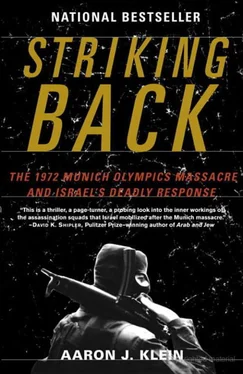• • •
The numbers show a steep slide in the frequency of terror attacks against Israelis and Israeli institutions abroad from 1974 to the present. At the end of the 1970s, top-ranking Israeli intelligence officials were in near unanimous agreement that Israel’s post-Munich wave of retaliatory and preventive assassinations gravely affected terrorist organizations, causing some to fold and others to limp. For Fatah and other groups that survived, the onslaught hindered their ability to function in Europe and deterred them from acting, forcing them to gradually abandon the idea of mega-attacks against Israeli targets abroad. That said, many in the Israeli intelligence community acknowledged that the Palestinians were also motivated by pragmatism. As time went on, the PLO realized that attacks outside Israel were doing their cause more harm than good.
On the Palestinian side, the leading consensus was to stand firm, which meant that the Mossad’s assassinations had not deterred them, as General Aharon Yariv and others at Israeli intelligence agencies believed—or wanted people to believe. The explanation for the drop and the eventual cessation of foreign attacks, rather, could be found in the Palestinians’ gradual transition from terrorism to political action and international diplomacy. This change peaked with Yasser Arafat’s speech at the United Nations in New York in 1974. The Palestinians had labored for international recognition—terrorism had been a part of that fight. Now they had it. There was no longer a need for international terrorism—and it could damage their image.
Most of the Israeli intelligence community remains convinced that their campaign forced an end to overseas terror.
BEIRUT, VERDUN ST.
MONDAY, JANUARY 22, 1979, 1535H
Ali Hassan Salameh was philosophical about the matter of his death, telling Time magazine, “They’re the ones who should be worried after all their mistakes. But I also know that when my number is up, it will be up. No one can stop it.”
It had been more than five years since Salameh had been directly involved in terrorism; even Black September, the name used by Fatah, was no longer active. But ever since the lethal blunder in Lillehammer, the urge to eliminate Salameh had been tied less to cold calculation and more to the human desire to right a historical wrong. For Mike Harari and Caesarea, so long as he lived and breathed, Ali Hassan Salameh was a testament to their great failure. That black stain could be erased only with his death.
Even in the immediate wake of the Lillehammer disaster, the intelligence gathering in the hunt for Salameh never stopped. R., Caesarea’s chief intelligence officer, pored over thousands of raw intelligence briefs looking for the man’s Capture Point. Every relevant detail gleaned from the raw data was checked, analyzed, and filed.
Raw intelligence data showed that Salameh spent an inordinate amount of time practicing karate and pumping iron. He would go to the gym for hours at a time nearly every day. Undercover Caesarea combatants combed Beirut’s gyms, putting miles on nearly every treadmill in the beleaguered city until they found their man. The Mossad operatives watched him carefully, noticing that he always hit the sauna before the shower. Soon, Mossad staff officers crafted a plan to plant a bomb under a sauna bench. The plan was discarded. There was no way to ensure that others would not join him at the last instant in the sauna or that the club wouldn’t be severely damaged, perhaps putting more lives at risk.
Thousands of hours of manpower, in field and office, were devoted to the hunt for Salameh—it was one of Israeli intelligence’s longest and most costly missions. HUMINT sources were asked time and again about the man, their ability to get close to him, his schedule, his habits, and his plans. The ears of Military Intelligence, Unit 8200, were instructed to intercept his calls or pick up any mention of his name. A new Mossad computer system searched satellite communication systems for the words “Ali Hassan Salameh” or “Abu-Hassan,” recording all such conversations both in Israel and abroad. The Ali Hassan Salameh search, which was costly from a number of different perspectives, was a project the Mossad and Caesarea conducted with everything they had.
His name came up in covert meetings the Mossad conducted with Lebanese Christian Phalangist leaders, who were in close contact and even friendly with Salameh. They were asked very gently to keep the Mossad abreast of his actions. In March 1976, the Mossad held a secret meeting with Bashir Gemayel, the leader of the Christian forces in Lebanon, and Military Intelligence officers in the seaside Israeli town of Herzaliya. The future president of Lebanon was asked to provide details of Salameh’s schedule and his daily routine. Gemayel promised to help, but his vow, like many of the Phalangists’ promises, was hollow. Fulfilling it promised no foreseeable benefit.
• • •
Ali Hassan Salameh was born in 1942, the firstborn child of Hassan Salameh, an important gang leader in British Palestine. His father was notorious for his murderous zeal during the Jewish-Arab riots in the 1930s. By 1939, after the fall of the Great Arab Revolt, he was forced to flee Palestine, an enormous £10,000 bounty on his head. He traveled through Syria, Iraq, and Lebanon with his young wife before returning to Palestine. Two weeks after Prime Minister David Ben-Gurion declared independence, he fell in battle. A mortar shell pierced his lung as he led three hundred men in a charge on a village recently captured by Israel. He was thirty-seven.
Ali was only six years old when he lost his father. He lived with his mother, Um-Ali (“mother of Ali”), and two younger sisters, Nidal and Jihad, in Beirut. They lived in prosperity until Ali was sixteen and the family decided to leave tumultuous Lebanon—refugees a second time over. The young Ali Salameh had no interest in politics. He was rich, far removed from the people in the teeming Palestinian refugee camps around the Middle East longing for home and revenge.
He went to West Germany to study engineering. But studies were the least of his interests. Far from the eye of Um-Ali, he breathed in the best of what Europe had to offer—elegant restaurants, palatial hotels, glittery nightclubs. He was obsessive about fashion, wearing well-tailored, exclusively black suits. He liked the company of women, and they liked him. His good looks, Eastern charm, and hospitality worked like a honey trap for young German women. The playboy spent hours each day sculpting his body in the weight room and practicing karate, which he recommended to all.
In 1963, he abided by his mother’s wishes and returned to Egypt to marry a simple young woman from the respected Husseini clan. Within a year he had his first son—Hassan, bestowing the title Abu-Hassan. But neither the wedding nor the birth of a child altered the habits of the narcissistic Ali Hassan Salameh. He remained a respected member of Cairo’s party scene, reveling in the city’s posh nightclubs till the early hours of the morning.
In 1976, at the height of his power and influence in Fatah, Salameh agreed to his only press interview. Speaking with Nadia Salti Stephan in Beirut, he spoke of growing up in the shadow of his father.
“The influence of my father has posed a personal problem for me. I grew up in a family that considered ‘struggle’ a matter of heritage which should be carried on by generation after generation…. My father was not the only one in the family to give his life for Palestine: some twelve young men in my family, mostly cousins, died in the 1940s. My upbringing was politicized. I lived the Palestinian cause…. When my father fell as a martyr, Palestine was passed on to me, so to speak. My mother wanted me to be another Hassan Salameh…. This had a tremendous impacton me. I wanted to be myself…. Even as a child, I had to follow a certain pattern of behavior…. I was made constantly conscious of the fact that I was the son of Hassan Salameh and had to live up to that.”
Читать дальше












